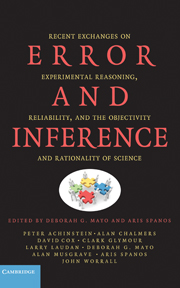 Error and Inference
Error and Inference Book contents
- Frontmatter
- Contents
- List of Contributors
- Preface
- Introduction and Background
- 1 Learning from Error, Severe Testing, and the Growth of Theoretical Knowledge
- 2 The Life of Theory in the New Experimentalism
- 3 Revisiting Critical Rationalism
- 4 Theory Confirmation and Novel Evidence
- 5 Induction and Severe Testing
- 6 Theory Testing in Economics and the Error-Statistical Perspective
- 7 New Perspectives on (Some Old) Problems of Frequentist Statistics
- 8 Causal Modeling, Explanation and Severe Testing
- 9 Error and Legal Epistemology
- Index
- References
4 - Theory Confirmation and Novel Evidence
Published online by Cambridge University Press: 29 January 2010
- Frontmatter
- Contents
- List of Contributors
- Preface
- Introduction and Background
- 1 Learning from Error, Severe Testing, and the Growth of Theoretical Knowledge
- 2 The Life of Theory in the New Experimentalism
- 3 Revisiting Critical Rationalism
- 4 Theory Confirmation and Novel Evidence
- 5 Induction and Severe Testing
- 6 Theory Testing in Economics and the Error-Statistical Perspective
- 7 New Perspectives on (Some Old) Problems of Frequentist Statistics
- 8 Causal Modeling, Explanation and Severe Testing
- 9 Error and Legal Epistemology
- Index
- References
Summary
In this chapter I address what seems to be a sharp difference of opinion between myself and Mayo concerning a fundamental problem in the theory of confirmation. Not surprisingly, I argue that I am right and she is (interestingly) wrong. But first I need to outline the background carefully – because seeing clearly what the problem is (and what it is not) takes us a good way towards its correct solution.
The Duhem Problem and the “UN” Charter
So far as the issue about confirmation that I want to raise here is concerned: in the beginning was the “Duhem problem.” But this problem has often been misrepresented. No sensible argument exists in Duhem (or elsewhere) to the effect that the “whole of our knowledge” is involved in any attempt to test any part of our knowledge. Indeed, I doubt that that claim makes any sense. No sensible argument exists in Duhem (or elsewhere) to the effect that we can never test any particular part of some overall theory or theoretical system, only the “whole” of it. If, for example, a theory falls “naturally” into five axioms, then there is – and can be – no reason why it should be impos-sible that some directly testable consequence follows from, say, four of those axioms – in which case only those four axioms and not the whole of the theory are what is tested.
- Type
- Chapter
- Information
- Error and InferenceRecent Exchanges on Experimental Reasoning, Reliability, and the Objectivity and Rationality of Science, pp. 125 - 169Publisher: Cambridge University PressPrint publication year: 2009
References
- 2
- Cited by


